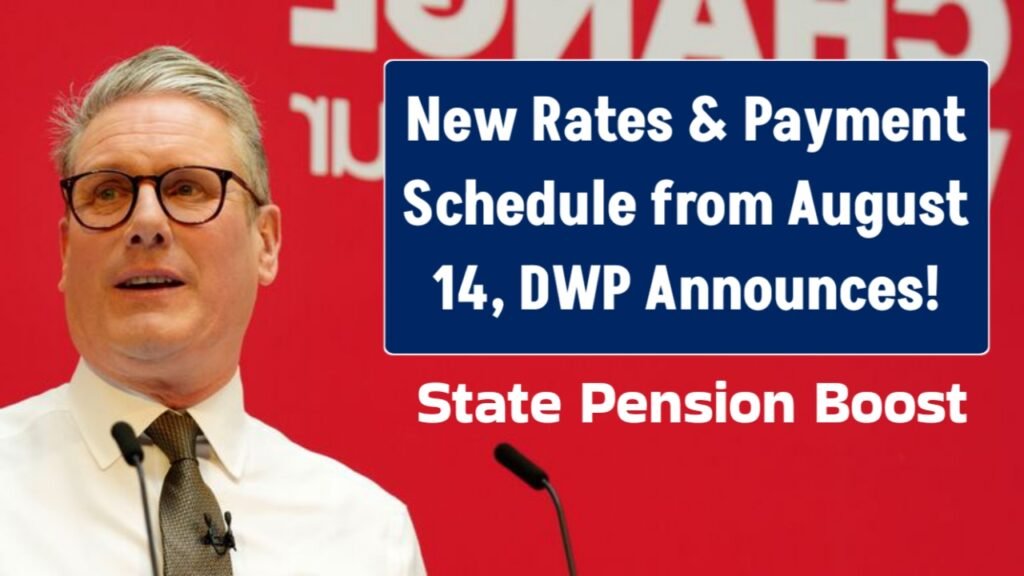The Department for Work and Pensions (DWP) has officially announced a boost to the UK State Pension rates, effective from August 14, 2025. This change comes as part of the government’s commitment to support pensioners amidst rising living costs. Millions of pensioners across the UK will see an increase in their weekly payments, helping them manage day-to-day expenses better. Understanding the new rates and the payment schedule is crucial for all eligible pensioners.
What Is the New State Pension Rate?
From August 14, 2025, the standard UK State Pension will rise to £549 per week. This represents a significant increase compared to previous years, reflecting inflation adjustments and government policies aimed at protecting pensioner incomes. The increase is designed to align pension payments more closely with the rising cost of living and ensure that pensioners do not lose purchasing power.
Who Is Eligible for the Increased Pension?
The new State Pension rate applies to all eligible individuals who have reached State Pension age as defined by the government. Currently, this age varies depending on your birth date but generally falls around 66 to 67 years old, with future plans for gradual increases. It is important to check your specific State Pension age on the official government website to understand when you can start claiming.
How to Check Your State Pension Age
To determine your exact State Pension age, you can visit the official UK government website or use online calculators specifically designed for this purpose. Knowing your State Pension age helps you plan your retirement finances and claim your pension on time to avoid delays or missed payments.
When Will You Receive Your Payments?
The DWP has confirmed that the new pension rates will be paid from August 14, 2025. Pensioners will continue to receive payments on their usual schedule, which is typically every four weeks. The payment method can be direct bank transfer, cheque, or postal order depending on the pensioner’s preference. It is advisable to ensure that your payment details with the DWP are up-to-date to avoid any payment disruptions.
How to Claim Your State Pension
If you have reached State Pension age and have not yet claimed your pension, it is important to apply as soon as possible. You can claim your State Pension online via the official government portal, by phone, or by post. The application process requires you to provide personal details and proof of your age and National Insurance contributions.
National Insurance Contributions and Pension Amount
The amount of State Pension you receive depends on your National Insurance (NI) record. Generally, to get the full new State Pension amount of £549 per week, you need at least 35 qualifying years of NI contributions or credits. If you have fewer years, your pension amount will be proportionally lower, but you may still qualify for a partial pension.
Can You Increase Your State Pension?
If you have gaps in your NI record, there are options to increase your State Pension. Voluntary NI contributions can be made to fill these gaps, often referred to as “Class 3” contributions. Consulting with a financial advisor or the DWP can help you understand if this option is right for you, especially before you reach State Pension age.
Impact of the Pension Boost on Other Benefits
An increase in the State Pension may affect eligibility for other means-tested benefits such as Pension Credit or Housing Benefit. It is important to review your benefits status after receiving the increased pension amount to understand any changes. The DWP provides guidance on how changes in your pension affect other benefits.
What to Do If You Haven’t Claimed Your Pension Yet
Many people do not claim their State Pension automatically and need to apply to receive payments. If you haven’t applied yet, it’s advisable to do so without delay. Delaying your claim can result in lost income. Claiming your pension early also ensures you receive the new increased rate as soon as you become eligible.
Pension Payment Dates in 2025
The DWP pays State Pension every four weeks, usually on the same weekday as the claimant’s birthday. With the new rates starting August 14, 2025, pensioners can expect payments to continue regularly after this date. Checking your payment schedule helps you manage your finances effectively.
How to Contact the DWP for Help
If you have questions about your State Pension, eligibility, or payment schedule, the DWP offers multiple channels for support. You can call the dedicated pension helpline, use online chat services, or visit local Jobcentre Plus offices. Getting assistance early can help resolve any issues quickly.
Preparing Financially for Retirement
The boost in State Pension rates is a welcome relief for many, but it’s still important to plan your retirement finances carefully. Combining your State Pension with private or workplace pensions, savings, and other income sources can help ensure a comfortable retirement. Seeking advice from financial experts can help create a retirement plan tailored to your needs.
FAQs About the State Pension Boost
Q: When does the new pension rate start?
A: The new rate of £549 per week begins on August 14, 2025.
Q: Who qualifies for the new pension rate?
A: Those who have reached State Pension age and meet NI contribution requirements.
Q: How often are State Pension payments made?
A: Payments are made every four weeks.
Q: Can I claim State Pension online?
A: Yes, applications can be made online, by phone, or by post.
Q: What if I have gaps in my National Insurance record?
A: You may make voluntary contributions to increase your pension.
Final Thoughts
The announced boost to the State Pension is a positive step by the government to help pensioners cope with inflation and rising costs. Ensuring you know your eligibility, claim your pension timely, and understand the new payment schedules will help you make the most of this increase. Stay informed through official channels and plan ahead for a secure and comfortable retirement.
